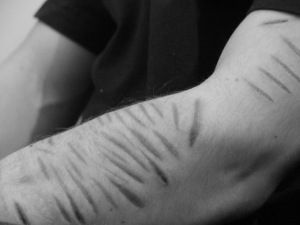News
Denmark offers no support to people who intentionally harm themselves
This article is more than 9 years old.
People who are cutting, burning or biting themselves have nowhere to turn to with their problems

So many young people are self-harming, it has become an epidemic (photo: Nina AJ)
Some 32 percent of Danes aged 18-25 have at some point in their lives harmed themselves by deliberately cutting, burning, biting or hitting themselves, revealed a survey carried out for the Centre of Eating Disorders and Self-Harm (ViOSS) in August 2015.
Meanwhile, in 2012, researchers from Aalborg University found that 22 percent of Danish high school students (ages 16-19) have committed some form of self-injury.
However, only a few Danish municipalities offer treatment to people who intentionally harm their own bodies, according to the National Association for Eating Disorders and Self-Harm.
READ MORE: Danish youth set record in self-harm
Need for special help
In Denmark, self-harm is not a recognised diagnosis, and unless people suffer from another mental illness or are suicidal, they have no right to receive special treatment.
Bo Møhl, a professor in clinical psychology at Aalborg University, worries that if young people do not get adequate support at an early stage, the risk they develop suicidal behaviour, depression or anxiety is high.
“We must have some centres and institutions that can help young people before they become so ill they are diagnosed with a mental illness,” Møhl told DR.
Epidemic development
Comparing the data from 2012 and last year, Lotte Rubæk, a psychologist at the child psychiatric ward at Bispebjerg Hospital, is concerned about the surge in young people harming themselves.
“It’s a very frightening trend because the development is an epidemic,” Rubæk told DR.
Møhl believes cutting and other self-harm practices spread among young people via social media, where they can get inspired to try it too.










































